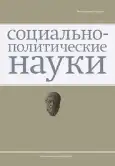Intercultural Dialogue in the Digital Space as a Factor of Socio-political Stability
- 作者: Gadzhiev K.A.1
-
隶属关系:
- Institute of Socio-Political Research of the Federal Center of Theoretical and Applied Sociology of the Russian Academy of Sciences (ISPR FCTAS RAS)
- 期: 卷 13, 编号 4 (2023)
- 页面: 49-54
- 栏目: Sociology of Culture
- URL: https://journals.eco-vector.com/2223-0092/article/view/583251
- DOI: https://doi.org/10.33693/2223-0092-2023-13-4-49-54
- ID: 583251
如何引用文章
详细
. Intercultural dialogue is the key subject of State national policy in any country. Despite the effects introduced by globalization, blurring unique features and universalizing the value basis of modern life, communities formed on an ethnic, confessional or linguistic basis (cultural communities), for the most part still retain their own identity, strive to maintain their value-behavioral patterns, customs, traditions and foundations. Therefore, the development of principles and management mechanisms capable of ensuring the coexistence of different cultural communities remains relevant for political-administrative systems. This is an essential condition for socio-political stability. The article is aimed at exploring the potential of the digital space for the formation of intercultural dialogue in the digital space contributing to the provision and maintenance of socio-political stability. The paper illustrates promising tools and properties of the digital space for communication and interaction of cultural communities; reflects the prerequisites, outlines the basic contours of intercultural dialogue in the digital space and the possible consequences of its impact on socio-political stability. According to the main conclusion of the analysis, the digital space creates completely new opportunities for building an intercultural dialogue, which political-administrative systems cannot ignore, striving for socio-political stability.
全文:
作者简介
Khanlar Gadzhiev
Institute of Socio-Political Research of the Federal Center of Theoretical and Applied Sociology of the Russian Academy of Sciences (ISPR FCTAS RAS)
编辑信件的主要联系方式.
Email: gadzhiev_hanlar@mail.ru
candidate of political sciences, senior research fellow
俄罗斯联邦, Moscow参考
- Tusalem R.F. Democracies, autocracies, and political stability. International Social Science Review. 2015. Vol. 90. No. 1. Pp. 1–40.
- Melibaev A.S. Ethnic leadership in the context of political transformations. In: Political space and social time: The power of symbols and the memory of generations: A collection of scientific papers of the XXXVIII International Kharaki Forum, Yalta, November 2–5, 2021. Simferopol: Arial, 2022. Pp. 226–228.
- Morozova O.N. Features of Internet communication: definition and properties. Bulletin of the Leningrad State University after name A.S. Pushkin. 2010. Vol. 1. No. 5. Pp. 154–156. (In Rus.)
- Nikitina E.V. Ethnic processes in the global information space. Information Society. 2014. No. 5–6. Pp. 78–79. (In Rus.)
- Shabrov O.F. Cultural policy and national–state sovereignty. Power. 2020. No. 6. Pp. 295–299. (In Rus.)
补充文件








